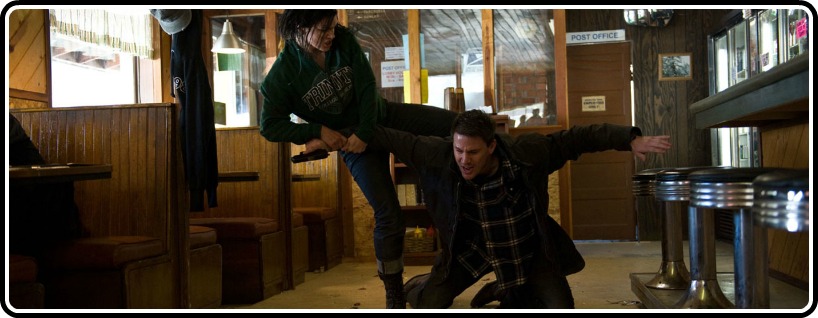
Haywire is a moderately empty exercise in formalism that lights up only when the physical, rigorous skills of retired mixed-martial-arts fighter Gina Carano (receiving the Sasha Grey treatment) get the spotlight. Thankfully, Carano’s physicality is not only called into action plenty, but looms over the film’s entirety.
Steven Soderbergh’s strongest directorial contribution (along with his use of sound as throughout) takes place during the fight scenes, with his decision to cut out all non-diegetic sound, and shoot with a clean distance. Every single one is a livewire delight. He allows these scenes to be entirely Carano’s show, and with his use and non-use of filmic devices says ‘˜pay attention folks; this is why I spent and time, money and effort to make this’. They are worthy and exhaustively fierce set-pieces.
Mallory Kane (Gina Carano) is on the run; but why? Told largely in flashbacks, we learn that Kane works for a private contractor and is hired for covert secret operations but is soon quitting and taking with her a lot of clientele who rely specifically on her abilities. After a mission to rescue a Chinese journalist in Barcelona goes according to plan, Kane is double-crossed whilst on a last-minute assignment in Dublin. On-the-run, Kane needs to figure out who double-crossed her and why, as well as connect it all back to the Barcelona mission where the attempted frame-up against her began.
Soderbergh and returning screenwriter Lem Dobbs make sure not to give Carano more than she can handle acting-wise. To answer the question ‘˜can she act’, the answer is not really, but the camera sure does love her. Some have found her demeanor of seemingly one-note indifference distracting, but for me her smoky no-nonsense presence is actually far more engaging than any other actor here. The goal here was never to turn Carano into an actress; it was to give her a chance to showcase her physical prowess. And this she does with aplomb, with the added bonus of her alluring je ne sais quoi throughout.
Aside from Carano and her action sequences, there is not much good to say. Haywire is too clean, too barebones without intrigue or consistency to support it. Its transparency is progressively evident and it is this, and not Carano, that becomes distracting. It feels like Dobbs struggled to stretch this to a full-length running time. Since its existence is to showcase Carano, the many scenes meant to fill in the blanks come off as expositional chores and tiresome meaningless table-setting.
At a certain point it becomes clear that Carano is all Soderbergh has to offer, and so the viewing experience becomes a waiting process in the hopes of arriving at the next action scene. The supporting characters played by Michael Douglas, Ewan McGregor, Michael Fassbender, Channing Tatum and Antonio Banderas all fail to register in the slightest, and I say this having gone in with the very low expectations set for supporting character development in action-thrillers. Only Bill Paxton is able to make something with his screentime.
Nothing falls into place the way it should. For one thing, no stakes whatsoever can be felt. Even if said stakes never really feel up for grabs they should still be remotely palpable, or at the very least, there to begin with. Sure, the double cross is elaborate but in a spinning its wheels kind of way. The screenplay by Dobbs wins the award for efficiency, but the rickety framing device is beyond weak, aligning the audience with a teenage non-character (the sadly thankless Michael Anagrano) who is present to repeat names of important people and places for us.
Soderbergh uses his skills to show off here with his typical precision and flair for shooting sequences in fairly off-kilter ways as he attempts to evoke a 70’s B-movie sensibility (this includes the purposefully simplistic plot). With the half-baked and unengaging story backing the formalist presentation, the final product emits an air of false superior ‘˜cool’ that is unearned. Hanna pulled off this sort of schtick a hell of a lot better. Taken as a whole, Haywire is surprisingly dull, and Soderbergh’s various aesthetic decorative touches read as empty self-consciousness. In the end, there are two impossibly strong reasons to seek it out (and please do if only for these elements) despite its indifferent nature; the mesmeric presence of Gina Carano and the cleanly shot action scenes that come with her.



